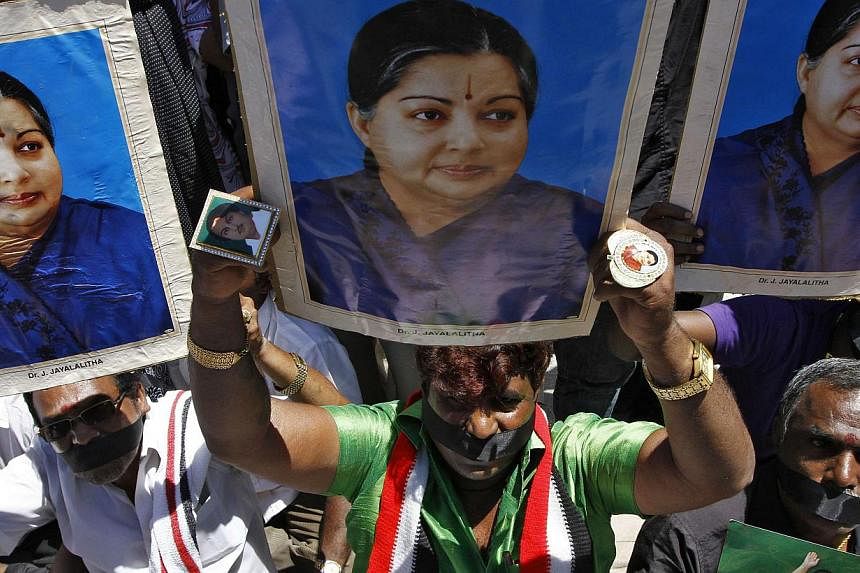Only the prospect of jail frightens corrupt Indian politicians. They are impervious to all other humiliations. Even more distressing is the idea of being tried for corruption, found guilty, escorted into a police van and put into a cell while still in office.
Jayalalithaa Jayaram, the colourful chief minister of Tamil Nadu and one of India's top women leaders, recently experienced such a degringolade.
A court found Jayalalithaa guilty of corruption on Sept 27, in a case that began 18 years ago when income tax officials raided her home. They found 30kg of gold, 800kg of silver, 10,000 saris, 750 pairs of shoes, over 100 watches and umpteen properties worth billions of rupees that had been acquired during her earlier tenure as chief minister from 1991 to 1996.
This is the first time a serving chief minister has been convicted under the Prevention of Corruption Act and gone to jail. As images of her stunned demeanour flashed into living rooms, Indians tried to grasp the magnitude of the event. Venal politicians must have felt stabs of chest pain.
The sentence is four years in jail. She will also be disqualified from holding office because the Supreme Court last year ruled that convicted MPs cannot continue as MPs. She has also been fined one billion rupees (S$21 million).
It seems a fair punishment for such gargantuan corruption. For once, just once, in this ornately hierarchical society, Indians have been treated as equal before the law. The verdict shows that if politicians loot the state exchequer, the law will eventually catch up with them.
Hardly any Indian politician has gone to jail for corruption. If this ruling is to do any good, it will be to deter other corrupt leaders. But an 18-year trial? There lies the problem. Who is going to be deterred when it takes so long for the wheels of justice to get going?
Jayalalithaa's marathon trial has seen seven judges and 130 adjournments. No wonder the law strikes so little fear in the hearts of corrupt MPs and ministers.
In fact, the saga is not entirely over because her lawyers will undoubtedly appeal against the verdict in the Supreme Court - adding another couple of years.
Recent developments in India have indicated a rising intolerance for corruption. People are sick of avarice on a scale that flies in the face of reason. But for the law to be effective in scaring politicians, the legal system must be totally overhauled so that verdicts are reached in a year or two.
Why does it currently take so long for the police to collect evidence? They should be given a fixed period in which to prepare their case, and, if they fail, they should be penalised.
Why does the system allow so many adjournments - many granted for utterly frivolous reasons and mostly designed to delay the progress of the trial? Adjournments must be allowed only for good reason.
Why does India have fewer than 15 judges per million population, compared with the United States, which has over 100 judges per million? Is it really impossible to produce more judges?
As a result of these flaws, India has 30 million pending cases clogging the system. The number boggles the mind. Former prime minister Manmohan Singh told Parliament a few years ago that India has the largest backlog of cases in the world. According to legal experts, it will take 466 years for the Delhi High Court alone to clear its backlog.
This situation is madness. If one reason had to be singled out to explain the audacity of politicians over corruption, it must be this. These decade-long delays help them get away with crimes, but the delays cause ordinary Indians to suffer in multiple ways. A family might have to wait 30 years to get back their home which someone has illegally occupied. The custody of children in divorce cases can take two decades to be decided, by which time the children have grown up. As for corrupt politicians, they can swan around for years - standing for election and holding office - before they are convicted.
Apart from the Law Ministry needing to reform the legal system to make it faster, India could set up fast-track courts to handle corruption cases involving MPs or civil servants. These courts need not be around forever.
Perhaps a period of five years will suffice. But in those five years, the quick verdicts and jail sentences will work to put the fear of God into those who steal public money. Later, they can be phased out, as and when the desired effect has been achieved.
Only fast and draconian punishment can be effective in dealing with the greed psychosis that afflicts Indian politicians.
"Psychosis" because how many saris or watches did Jayalalithaa want to wear every day? How many homes can she live in? How much gold jewellery can she wear on a given day (even if she throws on the clunky bling she was photographed wearing at weddings)?
This is a mental disorder, a primordial clawing that is not amenable to reason or the fear of shame and can only be tamed by a spell in jail.
Successive law ministers have talked of reforming the legal system but nothing has been done. If India is to build on the message sent out by the Jayalalithaa verdict, no more time should be lost.
The writer is a freelance journalist based in New Delhi, India.

